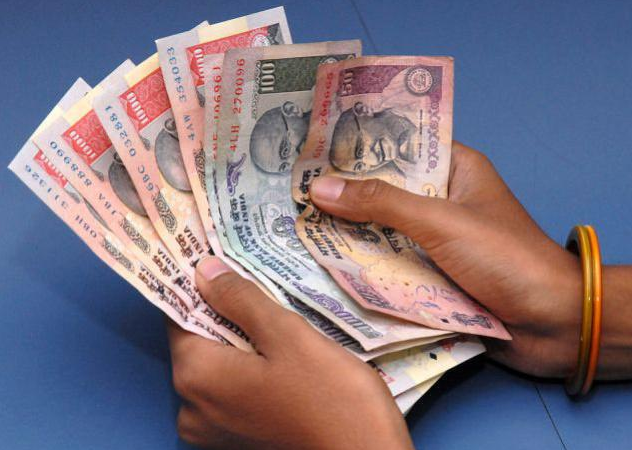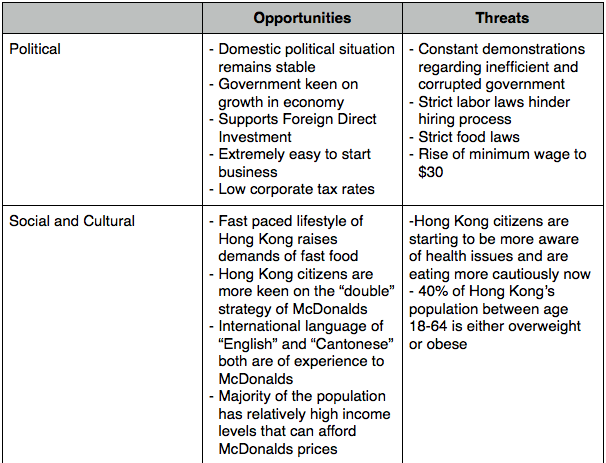After four consecutive months, inflation is rising tremendously in India. Inflation rose marginally to 6.84% in February, 2013 as food items such as rice, wheat, onions and fruits became costlier. Most notably the inflation rate in egg, meat and fish category was at 12.85%. McDonalds currently has over 100 outlets in India and are planning to double it by end of 2013. The inflation rate will cause huge issues as a majority of McDonalds products consist of egg and meat and with the huge inflation rate the materials will become increasingly costly. Furthermore, since India's inflation rate is so high, it will result in an extremely high cost of living, and when a country has a cost of living that is too high, it will result in instability and unrest.
Link to Article:
http://www.thehindu.com/business/Economy/inflation-moves-up-to-684-in-feb/article4508246.ece
On January 4th, 2013, President Obama has signed the law of "Food Safety Modernization Act", these laws give the "Food and Drug Association" more power in order to prevent disease outbreaks such as "Salmonella". These laws dictate that produce such as meat and egg must now be handled in systems that are geared to prevent any type of contamination. Furthermore, if any of the produce has found to be contaminated the information must be immediately relayed to the FDA. The FDA also has the right to conduct lab reports on the foods of restaurants such as McDonalds. Recently, on October 2012 employees from a McDonalds restaurant in Bloomington were found to be diagnosed with salmonella, leading to the McDonalds being shut down. Cases of food poisoning from McDonalds also occur regularly all around America. McDonalds needs to start examining their food (especially meat) sources more carefully and where they come from. These laws, though it may force McDonalds to use part of its profit to reinforce or re-new their hygiene systems all around America, may help rebuild the confidence of consumers in McDonalds.
Links to Article:
http://www.examiner.com/article/new-food-safety-laws-as-of-today
http://foodpoisoning.pritzkerlaw.com/archives/cat-mcdonalds-lawsuit.html
Political Factor Analysis:
Political concerns for McDonalds restaurants currently operating in Hong Kong are the strict labor laws and the rise of minimum wage to $30. The strict labor laws will make McDonalds hiring process more challenging as there are maximum working hours for days and weeks for specific age cohorts, therefore McDonalds will need to hire more workers to fit this law requirement. Furthermore, paying the increased amount of workers will also be difficult as the shift of minimum wage to $30 is a constraint for McDonalds. But taking these factors into account, McDonalds is a billion dollar multi-national company and these factors will not have a significant impact on McDonalds. McDonalds will definitely be able to keep up with the amount of increased workers and their wage in Hong Kong.
Socio-Cultural Factor Analysis:
McDonalds has been operating in Hong Kong for over 30 years and the market of Hong Kong is one that McDonalds is familiar with. The international language of “English” and “Cantonese” are both of experience to McDonalds and it’s relatively easy to hire employees who are competent in both these languages in Hong Kong. Furthermore, Hong Kong citizens are quite keen on the “doubling” of McDonalds burgers. Over these years, McDonalds have had “double cheeseburgers”, “double McFillet”, “double quarter pounders” etc and the market of Hong Kong has been responding positively to these “burgers”. Therefore, McDonalds can consider doubling more of its burgers to earn more profit and cater to the markets wants.
A major socio-cultural threat to McDonalds operating in Hong Kong, would be that Hong Kong citizens are now more aware of health and food related issues thanks to the government and advertising from NPO’s. This is a major threat as McDonalds will be losing a significant amount of customers due to this developing trend as McDonalds portray a strong image of unhealthy foods and obesity. Furthermore, a large part of McDonalds target market is made up of children and parents bring children to McDonalds. If this developing trend continues, parents may start to steer their children away from McDonalds which will lead to a significant decline in sales and profit.
Evaluation:
Taking the political and socio-cultural opportunities and threats into account, McDonalds should not change its international marketing strategy in Hong Kong. Looking from a political perspective, the situation in Hong Kong is relatively stable and the government is extremely open to direct foreign investment, making it easy for McDonalds to expand in Hong Kong as it is doing now. The minimum wage and strict labor laws will pose as a disadvantage but it will not create a significant impact on a well equipped, well resourced company like McDonalds. The fast paced lifestyle of Hong Kong citizens and the relatively high income will also ensure that McDonalds have a steady amount of customers. Though it is true that Hong Kong citizens are shifting to a more healthy diet, but if McDonalds were to cater to the demands of healthy eaters, they would alter their brand image entirely. Also, they would need to spend a lot of money on product research to develop healthy products that cater to the markets wants. Furthermore, if people were to eat healthy, they would never look to McDonalds as their first choice, making it futile for McDonalds to develop healthy products in the first place. McDonalds has built up brand loyalty over the 30 years operating in Hong Kong and customers will not switch so easily, therefore McDonalds does not need to frantically develop healthy products in fear that consumers might move away from them. In conclusion, McDonalds should keep its international marketing strategy of Hong Kong as it is.


 RSS Feed
RSS Feed
